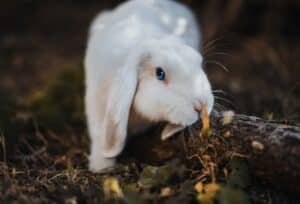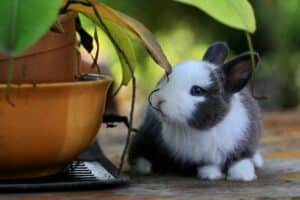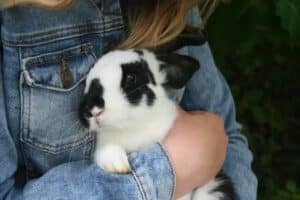Wondering if your rabbit can nibble on an apple? The simple answer is yes, rabbits can enjoy apples as an occasional treat. However, it’s critical to remove the seeds and stems, which can be harmful, and serve them in moderation. Discover how to do this safely and how apples fit into your pet’s diet in our comprehensive guide on “Can rabbit eat apples”.
Key Takeaways
- Apples can be a safe and enjoyable treat for rabbits, provided they are given in moderation and seeds and stems are removed due to toxicity risks.
- The appropriate serving size of apple for a rabbit is 1 to 2 tablespoons per 5 pounds of body weight, recommended no more than once or twice a week to prevent health issues.
- While apples are suitable treats, a rabbit’s main diet should be grass hay, leafy green vegetables, and specially formulated rabbit pellets to ensure balanced nutrition.
Decoding the Rabbit’s Diet: Can Rabbits Have Apples?
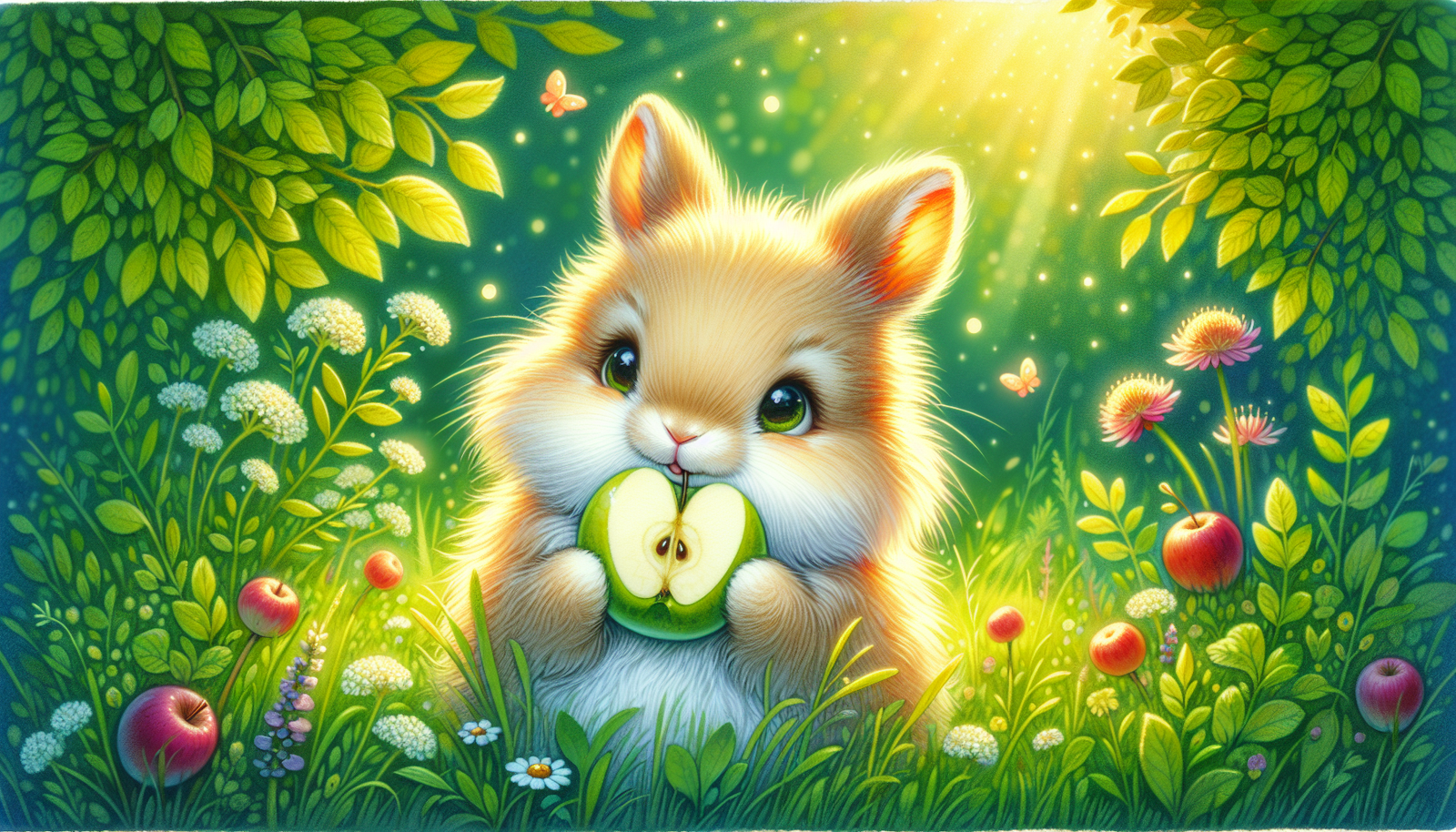
As the old saying goes, an apple a day keeps the doctor away, but does this adage hold any water when it comes to our pet rabbits? Many rabbits relish the sweetness of apples, yet it’s important to remember that moderation is key. Apples are safe for rabbits to eat when given as an occasional treat, not as a staple food.
But before you go slicing up an apple for your furry friend, some precautions are needed. It is crucial to remove all seeds and stems when preparing apples, as these parts can pose serious health risks to rabbits. This is due to apple seeds containing cyanogenic glycosides, which can release cyanide, a toxic compound harmful to rabbits. So, while rabbits can certainly enjoy the flesh of an apple, the seeds and stems are a definite no-go.
Preparing Apples for Your Bunny: A Step-by-Step Guide
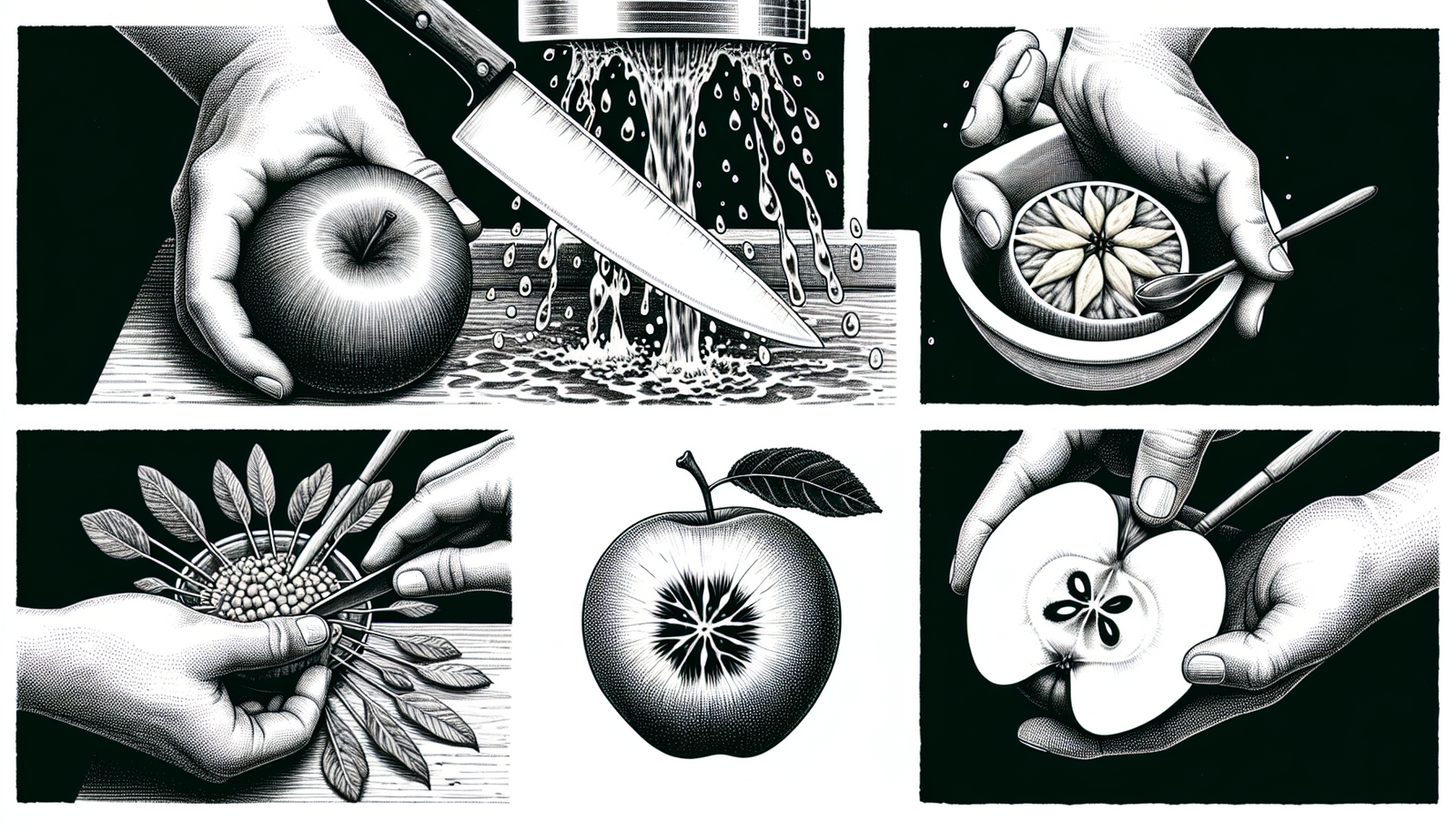
Knowing that rabbits can eat apples as a treat, the next step is to properly prepare the apple for your bunny. Begin by thoroughly washing the apple and cutting it into eighths, ensuring that the core is removed.
Before offering the apple to your rabbit, it’s paramount to remove all seeds and the stem to prevent toxicity. Now that all the potentially harmful parts are removed, the next step might be a little surprising. To make apple slices more appealing, execute a shallow diamond-shaped cut on the slice’s top surface. This not only enhances the appeal but also makes it easier for your rabbit to eat.
Finish the preparation by cutting from underneath the skin until the apple piece detaches easily. This enhances the shape of the rabbit and makes it easier for them to handle and enjoy their treat.
The Sweet Spot: How Much Apple Can a Rabbit Eat?
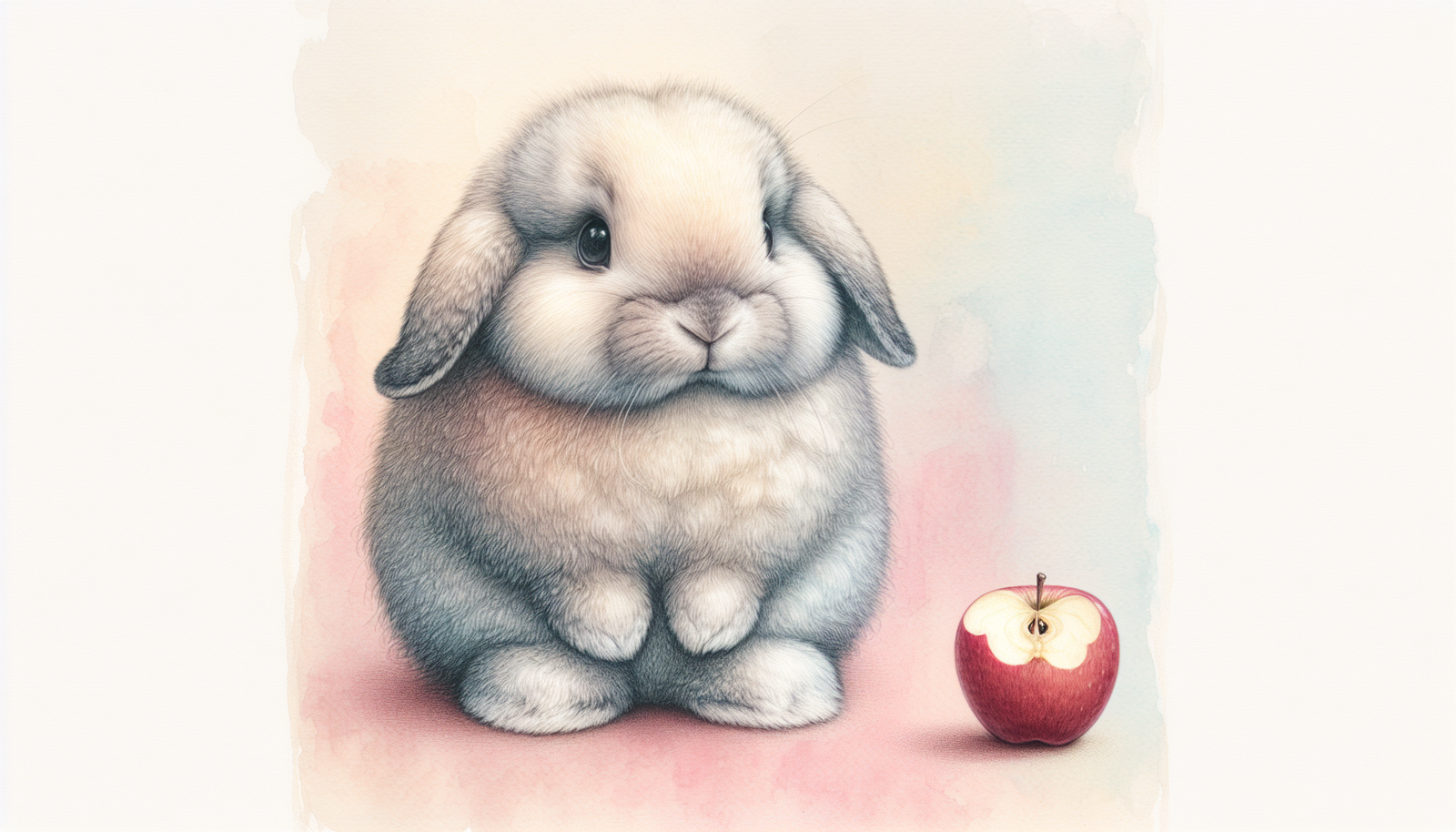
Now we’ve covered that rabbits can eat apples and how to prepare them, the next question is – how many apples can a rabbit eat? The appropriate serving size of apple for a rabbit is 1 to 2 tablespoons for every 5 pounds of body weight. This might seem like a small amount, but remember, apples are a treat, not a main part of their diet.
Apple treats can be offered to rabbits once or twice a week, ensuring they remain a special treat rather than a staple of their diet. On days when rabbits receive apple treats, their overall daily caloric intake should be adjusted to maintain a balanced diet and prevent obesity.
While apples can be a healthy treat, they should always be given in moderation to prevent any stomach upset due to their natural sugar content. So, while your rabbit might hop for joy at the sight of an apple treat, remember that a little goes a long way.
Beyond the Fruit: Can Rabbits Eat Other Parts of the Apple Plant?
Having established that rabbits can safely consume apples, you might be wondering about other parts of the apple plant. Good news for our furry friends – rabbits can eat various parts of the apple plant, including leaves and sticks, which are safe for them.
Apple tree leaves can be a good feed for rabbits as long as they are not treated with pesticides or harmful chemicals. In the winter, rabbits may consume the bark of young apple trees, which is easier to chew and digest due to its tenderness.
However, when introducing parts of the apple plant into a rabbit’s diet, it’s essential to ensure they are free from chemicals and pesticides to ensure the rabbit’s safety. So, while the apple fruit is a safe treat, the rest of the apple plant can also be a nutritious bonus for your rabbit.
Mixing It Up: Incorporating Apples into a Rabbit’s Balanced Diet
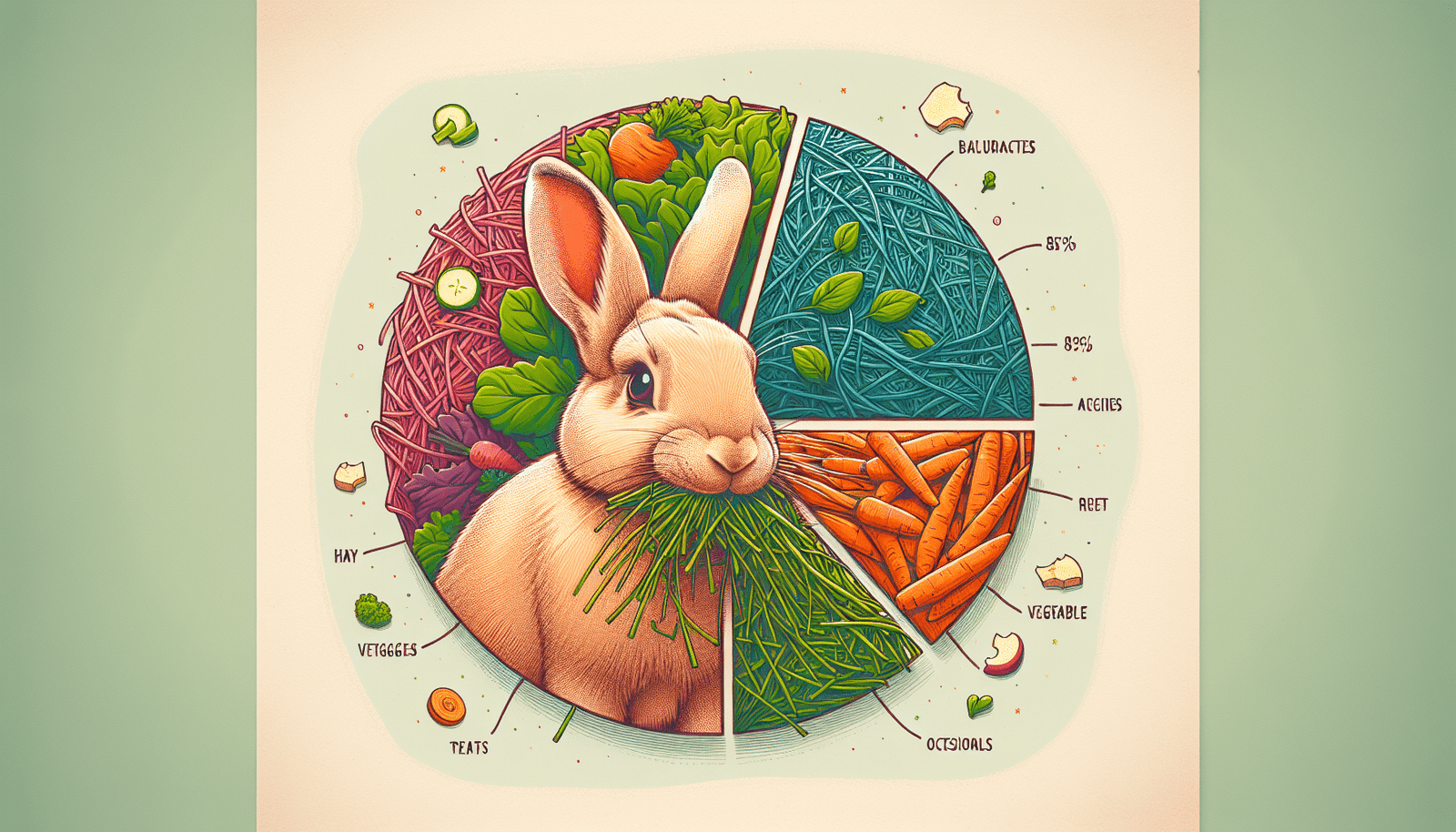
So far, we’ve covered that apples (and some parts of the apple plant) can be a welcome addition to a rabbit’s diet. But it’s essential to understand where these fit in the grand scheme of a balanced diet for your pet rabbit. The majority, approximately 85%, of their overall intake should be grass hay.
Provide rabbits with a bundle of hay each day at least the size of the rabbit itself to meet their dietary needs. Timothy hay is a great choice as it not only enriches the rabbit’s diet as a treat but also aids in the natural wearing down of their continuously growing teeth.
A varied diet is key for rabbits. Integrate a variety of vegetables and greens to keep feeding times interesting and nutritionally balanced. Incorporate a daily handful of fresh leafy greens per adult rabbit size into their diet to reinforce proper nutrient intake.
So, while rabbits may enjoy the odd apple treat, remember that a balanced diet is primarily made up of fresh hay, such as alfalfa hay, leafy green vegetables, and rabbit pellets. In fact, rabbits eat apples only occasionally as a treat, and their main diet should consist of these other essential components.
An Apple a Day? Understanding the Risks of Overfeeding Fruits
While we’ve established that apples can be a delightful treat for rabbits, it’s crucial to understand the risks of overfeeding fruits. Rabbits may enjoy apples as treats, but overconsumption due to high sugar content must be avoided.
Feeding rabbits excessive amounts of fruit can cause gastrointestinal disturbances and dental problems. High sugar content in fruits like apples can contribute to obesity in rabbits when overfed. Not to mention, large quantities of fruits may also lead to severe health issues, including bladder stones in rabbits.
So, while it’s tempting to spoil our furry friends with their favorite treats, remember – moderation is key. Overfeeding fruits can lead to serious health issues, making it all the more important to balance fruit treats with a diet rich in hay and vegetables.
Alternatives to Apples: Safe Treats for Your Pet Rabbit
For those looking to diversify their rabbit’s diet, there are plenty of safe alternatives to apples. Rabbits can enjoy a variety of fruits such as:
- strawberries
- bananas
- kiwi
- melon
- pears
- plums
- mangoes
- apricots
- berries
When it comes to snacking, it’s important to remember that moderation is key. An adult-sized handful of healthy treats is a reasonable portion to enjoy occasionally, without overindulging.
In addition to fruit, rabbits can enjoy various vegetables, plants, and herbs as treats. Commercial rabbit treats, which are often high in sugar, should be avoided; healthier alternatives include fresh vegetables, plants, and herbs.
However, when introducing any new foods such as fruits, vegetables, or herbs, it is crucial to do so gradually to monitor for signs of digestive upset or other adverse reactions. So, while apples are a safe treat, there’s a whole world of other nutritious snacks your rabbit can enjoy.
Hydration and Health: The Role of Water in a Rabbit’s Diet
Beyond the solid foods in a rabbit’s diet, hydration plays a crucial role in their overall health. Water is critical for a rabbit’s health, sustaining every cell and organ. Adequate water intake is crucial for a rabbit’s digestion, keeping food moist and facilitating smooth movement through the gut.
Water is not just essential for digestion but also aids in preventing Gastro-Intestinal Stasis, a life-threatening condition caused by dehydrated gut contents leading to a digestive blockage. Moreover, water helps flush out excess calcium that rabbits absorb from their diet, preventing urinary stones and other related bladder problems.
Rabbits must have constant access to fresh, clean water to stay healthy. Many rabbits show a preference for water bowls, which support adequate hydration over water bottles. So, while we focus on what solid foods our rabbits can and should eat, let’s not forget the essential role of water in their diet.
Summary
Throughout this blog post, we’ve dived deep into the topic of rabbits and apples, exploring everything from preparation to portion sizes, and even alternatives. We’ve learned that while apples can be a delightful treat for our pet rabbits, they should be given in moderation and never as a staple food. We’ve also discovered that beyond the apple fruit, other parts of the apple plant can be a nutritious addition to our rabbit’s diet, provided they are free from harmful chemicals and pesticides.
In conclusion, while fruits like apples can certainly add some sweetness to our rabbit’s diet, the majority of their nutritional needs should come from a diet rooted in grass hay, supplemented with a variety of vegetables and greens. Lastly, the importance of water in their diet cannot be overemphasized, playing a crucial role in digestion, preventing health issues, and maintaining overall well-being.
Frequently Asked Questions
Can rabbits eat apples?
Yes, rabbits can eat apples, but they should only be given as an occasional treat and all seeds and stems should be removed.
How should I prepare apples for my rabbit?
To prepare apples for your rabbit, wash the apple, remove the core, seeds, and stem, then cut it into eighths. Consider making a shallow diamond-shaped cut on the top surface of the apple slice for appeal.
How much apple can a rabbit eat?
A rabbit can eat 1 to 2 tablespoons of apple for every 5 pounds of body weight once or twice a week to ensure a balanced diet.
Can rabbits eat other parts of the apple plant?
Yes, rabbits can eat leaves and sticks from the apple plant as long as they are pesticide-free.
How important is water in a rabbit’s diet?
Water is crucial for a rabbit’s health as it aids in digestion, prevents Gastro-Intestinal Stasis, and flushes out excess calcium. Therefore, rabbits must have constant access to fresh, clean water to stay healthy.

